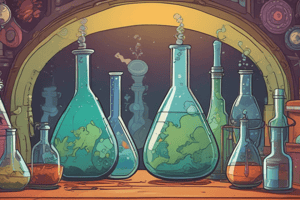Podcast
Questions and Answers
What is the primary goal of the scientific method?
What is the primary goal of the scientific method?
- To observe and describe a phenomenon
- To identify the cause-and-effect relationship between variables (correct)
- To disprove a hypothesis
- To develop a theory
What is the term for the condition being measured in an experiment?
What is the term for the condition being measured in an experiment?
- Control Group
- Constant
- Independent Variable
- Dependent Variable (correct)
What is the characteristic of life that involves responding to stimuli?
What is the characteristic of life that involves responding to stimuli?
- Growth
- Stimuli (correct)
- Energy
- Homeostasis
What is the term for an explanation with evidence?
What is the term for an explanation with evidence?
What is the term for the 'cause' in an experiment?
What is the term for the 'cause' in an experiment?
What is the characteristic of life that involves the organization of cells into tissues and organs?
What is the characteristic of life that involves the organization of cells into tissues and organs?
What is the main difference between the experimental group and the control group in an experiment?
What is the main difference between the experimental group and the control group in an experiment?
Which of the following types of data is used to describe the characteristics of something?
Which of the following types of data is used to describe the characteristics of something?
What is the purpose of the hypothesis in the scientific method?
What is the purpose of the hypothesis in the scientific method?
Which of the following is an example of homeostasis?
Which of the following is an example of homeostasis?
What is the name of the scientific principle that describes the characteristics of life?
What is the name of the scientific principle that describes the characteristics of life?
Which step of the scientific method involves making a conclusion based on the results of the experiment?
Which step of the scientific method involves making a conclusion based on the results of the experiment?
Flashcards are hidden until you start studying
Study Notes
The Scientific Method
- Observe: make an observation about the world around you
- Question: ask a question about what you've observed
- Hypothesis: propose a possible explanation for what you've observed, in the form of "If IV, then DV"
- Experiment: design an experiment to test your hypothesis, where:
- One variable is changed (IV, or independent variable) while everything else remains the same
- The experimental group receives the treatment, and the control group is used for comparison
- The IV is the "cause" on the x-axis, and the DV (dependent variable) is the "effect" on the y-axis
- Constants are factors that remain unchanged throughout the experiment
- Analysis: examine the data collected during the experiment, which can be:
- Quantitative: numerical data
- Qualitative: descriptive data
- Conclusion: summarize the findings, avoiding the use of "prove" or "disprove"
- Theory: an explanation supported by evidence
- Law: a statement of fact without explanation
Characteristics of Life
- COGHERES: an acronym to remember the characteristics of life:
- C: cells (all living things are made of one or more cells)
- O: organization (cells to tissues to organs to organ systems)
- G: growth (DNA serves as instructions for growth and development)
- H: homeostasis (regulating steady internal conditions)
- E: energy (requires energy from the sun)
- R: reproduction (species produce their own offspring)
- E: evolution (changes in species over time)
- S: stimuli (respond to stimuli)
The Study of Life
- Biology is the study of life.
The Scientific Method
- The scientific method involves a series of steps to answer a question or solve a problem.
- The steps are:
- Observe: make an observation about the world.
- Question: ask a question about what you have observed.
- Hypothesis: make an educated guess that answers the question.
- "If IV...then DV": write the hypothesis in a clear and concise format.
- Experiment: design an experiment to test the hypothesis.
- Analysis: analyze the data collected during the experiment.
- Conclusion: draw a conclusion based on the data analysis.
Experiment Design
- In an experiment, everything is controlled except for one variable.
- The experimental group receives the treatment being tested.
- The control group is used for comparison.
- The independent variable (IV) is the condition being tested and is represented on the x-axis.
- The dependent variable (DV) is the condition being measured and is represented on the y-axis.
- A constant is a factor that remains unchanged throughout the experiment.
Data Analysis
- Quantitative data are numbers.
- Qualitative data are descriptions.
Conclusion
- Avoid using "prove" or "disprove" in your conclusion.
- A theory is an explanation with evidence.
- A law is a truth with no explanation.
Characteristics of Life
- COGHERES is an acronym that summarizes the characteristics of life:
- C (cells): all living things are made of one or more cells.
- O (organization): cells are organized into tissues, organs, and organ systems.
- G (growth): DNA serves as the instructions for growth and development.
- H (homeostasis): living things regulate their internal conditions to maintain a stable environment.
- E (energy): living things require energy from the sun.
- R (reproduce): species produce their own offspring.
- E (evolve): species change over time.
- S (stimuli): living things respond to stimuli.
Studying That Suits You
Use AI to generate personalized quizzes and flashcards to suit your learning preferences.




